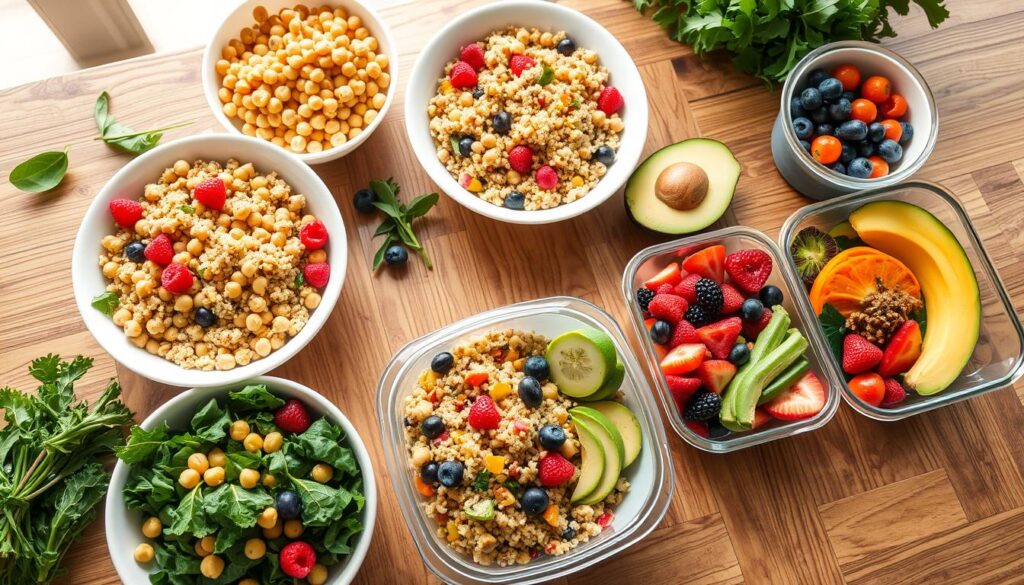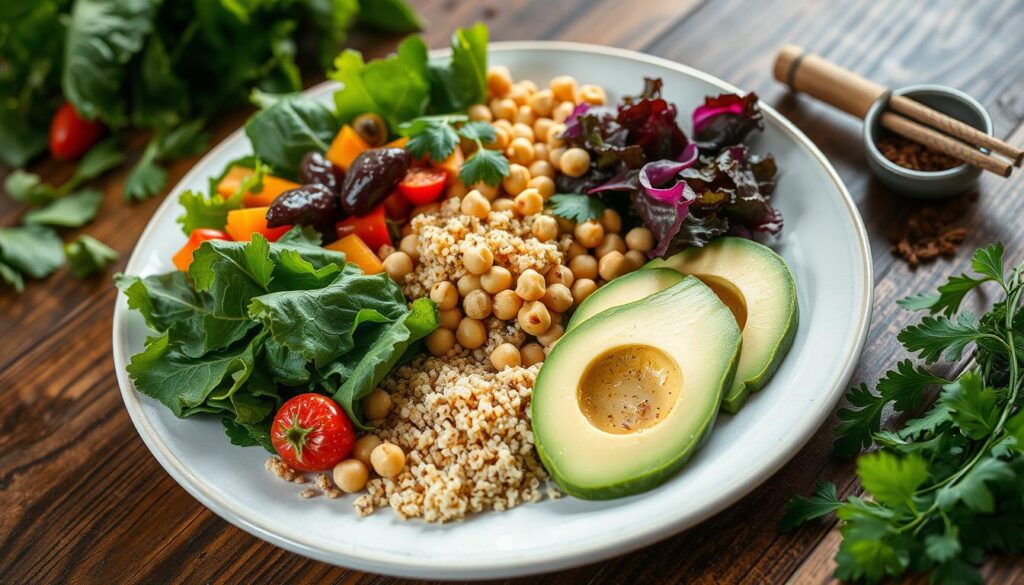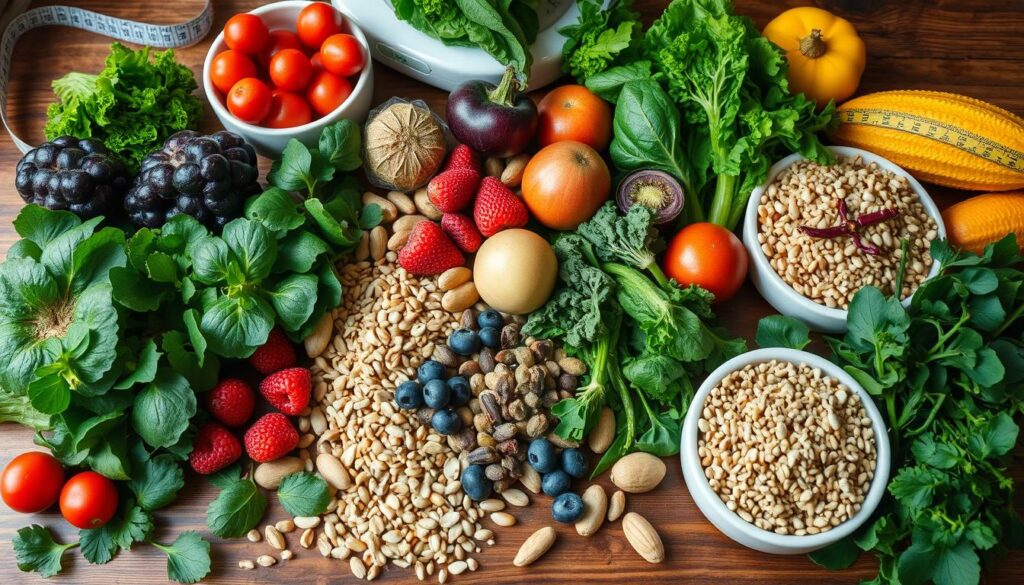If you want to lose weight and follow a plant-based diet, a vegan diet weight loss plan might help. This plan is for 1,200 calories a day. It helps you lose 1-2 pounds each week and can save you money too.
This plan uses foods rich in protein and fiber. It also uses leftovers to keep costs low. Each serving costs just $50 a week.
Meal prepping is key to losing weight on a vegan diet. Make vegan banana bread, overnight oats, and roasted veggies in advance. This makes it easier to eat healthy, even when you’re busy.
This plan gives you the nutrients you need to lose weight. It’s all about eating right and staying healthy.
Key Takeaways
- A vegan diet weight loss plan can help you lose 1-2 pounds per week while saving money.
- The 1,200-calorie meal plan focuses on healthy plant-based whole foods high in protein and fiber.
- The plan strategically uses ingredients and leftovers throughout the week, keeping the per-serving cost at $50.
- Meal prepping, including making batches of vegan banana bread, overnight oats, and roasted vegetables, is essential for success.
- The vegan meal plans are tailored to provide the right balance of essential nutrients to support your weight loss journey.
Understanding the Fundamentals of Plant-Based Weight Loss
Starting a vegan weight loss journey is exciting. It’s important to know the basics of plant-based weight management. Aim for a calorie deficit of 250-500 calories a day. This can be done with a balanced vegan diet and regular exercise.
Make sure to get enough vitamin B12, iron, calcium, iodine, niacin, riboflavin, vitamin D, zinc, and omega-3 fatty acids. These nutrients are key for staying healthy and avoiding nutritional gaps.
Caloric Deficit on a Vegan Diet
To lose weight on a vegan diet, you need to eat fewer calories than your body uses. Studies show people on plant-based diets lose about 4.5 pounds in 18 weeks compared to non-vegetarian diets. Watch your calorie intake and stay active to lose weight steadily.
Essential Nutrients for Vegan Weight Loss
- Vitamin B12: Important for energy, red blood cells, and brain function.
- Iron: Helps carry oxygen, supports the immune system, and boosts energy.
- Calcium: Keeps bones and teeth strong, and aids in muscle and nerve function.
- Iodine: Helps with metabolism and thyroid health.
- Niacin and Riboflavin: Key for energy and metabolic health.
- Vitamin D: Helps with calcium absorption and immune function.
- Zinc: Important for protein, healing, and immune response.
- Omega-3 Fatty Acids: Good for heart health and reducing inflammation.
Benefits of Plant-Based Weight Management
Choosing a vegan diet for weight loss has many health benefits. Plant-based diets may lower heart disease, cancer, cognitive decline, and type 2 diabetes risks. They also help the planet by reducing greenhouse gas emissions, land use, and water use by a lot.
Learning about plant-based weight loss opens the door to a healthier, greener lifestyle. It fits well with your vegan weight loss recipes, cruelty-free weight management, and ethical weight loss goals.
Getting Started with a Vegan Diet Weight Loss Plan
If you want to start a whole food plant-based diet for weight loss, first find out how many calories you need. Our meal plan gives about 1,500 calories a day. This can help you lose 1-2 pounds each week. If you need more, like 2,000 calories, we can adjust it for you.
A plant-powered slimming plan means no animal products. This includes meat, fish, dairy, and honey. Instead, eat lots of beans, lentils, nuts, seeds, whole grains, fruits, and veggies. It helps you lose weight and gets you healthier too.
- Make a meal plan that matches your calorie needs and likes.
- Make a big grocery list and buy all the ingredients you need.
- Set aside time each week for meal prep, portioning, and storing your vegan meals.
- Try new recipes and cooking ways to keep your vegan diet fun and lasting.
Plan and prepare your meals ahead of time. This way, you can easily follow the whole food plant-based diet. You’ll reach your plant-powered slimming goals too.
“Going plant-based can save $750 a year per person on grocery bills according to research published in the Journal of Hunger & Environmental Nutrition.”
Essential Plant-Based Protein Sources for Weight Loss
Starting your vegan diet for weight loss is easy. You just need to know about plant-based proteins. These foods help keep your muscles strong and boost veggie-driven fat burning. Let’s look at the best plant-based nutrition sources for a healthier weight.
Complete Protein Combinations
Many plant proteins are not complete. But, you can make complete protein pairs. For instance, eating whole grains like quinoa with legumes like lentils gives you all the amino acids you need.
High-Protein Vegan Foods
- Seitan: 25g protein per 3.5 oz (100g)
- Tofu, tempeh, and edamame: 12-20g protein per 3.5 oz (100g)
- Lentils: 18g protein per cooked cup (198g)
- Beans: 15g protein per cooked cup (170g)
- Nutritional yeast: 8g protein and 3g fiber per 0.5 oz (16g)
- Hemp seeds: 9g protein per 3 tbsp (30g)
Protein Timing and Portions
Try to eat 20-30g of plant-based protein at each meal. This keeps your muscles strong and helps with veggie-driven fat burning. Add protein-rich foods like nut butter and edamame to your meals and snacks.
Focus on these plant-based nutrition sources. They give your body the amino acids it needs for a successful vegan weight loss journey.
Creating a Budget-Friendly Vegan Meal Plan
Going vegan doesn’t have to cost a lot. You can plan meals that are good for you and help you lose weight. Use foods like beans, lentils, and tofu for protein.
Plan your meals around the same ingredients all week. This saves money and reduces waste. Check what you already have before you shop. Make a list and stick to it to avoid buying things you don’t need.
Shop at local farmers’ markets or ethnic stores for cheaper produce. Buying big packs of grains, nuts, and seeds can also save you money.
| Ingredient | Estimated Cost |
|---|---|
| Apples (5 lbs) | $5.00 |
| Bananas (5 lbs) | $3.00 |
| Blueberries (1 pint) | $3.00 |
| Broccoli (2 heads) | $4.00 |
| Carrots (5 lbs) | $3.00 |
| Celery (3 bunches) | $3.00 |
| Cilantro (3 bunches) | $2.21 |
| Dates (1 lb) | $5.00 |
With just $63.21, you can have a week of vegan meal plans. This shows you can eat well and affordably. Focus on whole foods for tasty and budget-friendly vegan meals.

Strategic Meal Prepping for Vegan Weight Loss Success
To lose weight on a vegan diet, you need to plan your meals. Spend a little time each week to prep for the whole week. Here are some tips and tricks to make vegan meal prep easy and effective.
Weekly Preparation Guidelines
- Batch cook staples like brown rice, quinoa, and roasted veggies.
- Make breakfasts like overnight oats and energy balls ahead of time.
- Put meals in containers for easy grab-and-go.
Storage and Portioning Tips
Storing and portioning right keeps your meals fresh and controlled. Use good airtight containers. And, use a food scale for exact portions.
Time-Saving Prep Techniques
Use tools and methods to make meal prep faster. A food processor chops veggies quickly. Also, cook soups and casseroles in bulk for many meals.
With these meal prep tips, you’ll be on your way to vegan weight loss success all week.
Balancing Nutrients for Optimal Weight Loss
Starting a whole food plant-based diet for weight loss needs careful planning. You must get all the vitamins, minerals, and macronutrients your body needs. Eating a variety of fruits, vegetables, whole grains, legumes, nuts, and seeds helps.
Make sure you get enough protein, iron, calcium, vitamin B12, and omega-3 fatty acids. These nutrients help keep your energy up, boost your metabolism, and support your health. You might need to take vitamin B12 and vitamin D supplements.
Try to have a balanced plate at every meal. Half should be vegetables, a quarter whole grains, and a quarter plant-based protein. This helps you get the nutrients you need while keeping calories low for weight loss. Good examples include oatmeal with berries, tofu scramble, lentil soup, and stir-fries with quinoa.
| Nutrient | Vegan Food Sources |
|---|---|
| Protein | Tofu, tempeh, lentils, chickpeas, quinoa, seitan, edamame |
| Iron | Leafy greens, lentils, chickpeas |
| Calcium | Fortified plant-based milk, tofu, kale, almonds |
| Vitamin B12 | Fortified plant-based milk, nutritional yeast, Shiitake mushrooms |
| Omega-3s | Flaxseeds, chia seeds, walnuts, algae-based supplements |
Focus on eating nutrient-rich whole foods and use supplements when needed. This way, you can have a balanced vegan diet that helps with weight loss and keeps you healthy.

Common Challenges and Solutions in Vegan Weight Loss
Starting a vegan diet for weight loss is rewarding but comes with challenges. You might face nutritional gaps, hunger, and cravings. The solution is to be proactive and find creative ways to overcome these hurdles.
Addressing Nutritional Deficiencies
Ensuring you get all nutrients on a vegan diet is key. Eat lots of leafy greens, legumes, nuts, seeds, and fortified plant milks. Also, think about taking supplements like vitamin B12, iron, and omega-3s.
Managing Hunger and Cravings
Managing hunger and cravings on a vegan diet weight loss plan can be tough. Eat foods high in fiber like fruits, veggies, and whole grains. Drinking water and adding healthy fats like avocado or nut butters can also help.
Dining Out Strategies
Eating out on a vegan diet weight loss plan can be hard. But, with some planning, you can find vegan options. Look up the menu ahead of time and ask for vegan-friendly dishes. Choose veggie-based meals and watch your portion sizes and oils to stay on track with your ethical weight loss goals.
By tackling these common issues and finding solutions, you can make a vegan diet weight loss plan work for you. This way, you can reach your health and wellness goals.
Incorporating Exercise with Your Vegan Diet
Starting a veggie-driven fat burning lifestyle means eating foods full of nutrients. You also need to exercise regularly. This mix of a plant-powered slimming diet and exercise will help you lose weight.
Try to do at least 150 minutes of moderate exercise each week. You can walk fast, cycle, swim, or dance. These activities help burn fat and keep your heart healthy.
Don’t forget to do strength training two times a week. It helps keep your muscles strong. You can do bodyweight exercises, use weights, or try yoga.
Choose exercises you like. It’s easier to keep up with a routine if you enjoy it. Find what fits your life and tastes.
“A balanced vegan diet and regular exercise are key to plant-powered slimming success.”
Using a veggie-driven fat burning plan can help you lose weight. It combines healthy eating and exercise. This way, you’ll lose weight and stay healthy and full of energy.
Conclusion
A vegan diet can help you lose weight in a healthy way. It focuses on eating lots of plant foods. This helps you feel full and lose weight.
It’s also good to plan your meals and exercise often. This way, you can keep losing weight while eating vegan.
Before you start, talk to a doctor or dietitian. They can help make sure you’re doing it right.
Studies show that eating plants can help you lose more weight. It can also lower your cholesterol and help with health problems.
So, if you’re starting a vegan diet, get excited. There are so many tasty plant foods to try. With the right plan, you can lose weight and feel better.
Good luck on your vegan diet journey. May you find joy in eating healthy and feeling great.


A Life-Changing Experience with This Weight Loss Supplement (Nagano Tonic)
I’ve always struggled with finding a weight loss solution that actually works for me. Like many, I’ve tried numerous diets, exercise routines, and supplements over the years—some worked for a short time, but nothing ever gave me long-term results. That was until I decided to try the weight loss supplement I found : Link to the Supplement.
From the moment I started using it, I noticed a difference. Not only did I feel more energized, but my cravings also became more manageable. The best part? I started seeing results much quicker than I anticipated! Over the course of just a few weeks, I noticed a significant reduction in belly fat and overall weight loss that I hadn’t been able to achieve before.
What makes this supplement stand out from all the others I’ve tried is how it supports me in my daily routine without any jitters or energy crashes. I’m able to stay focused and motivated, which has made it easier to stay on track with my diet and exercise plan.
This product truly exceeded my expectations, and I feel more confident and healthier than ever before. If you’re struggling with your weight loss journey like I was, I highly recommend giving this supplement a try. It’s been a game-changer for me, and I’m sure it can work wonders for you too!
Contant Them on email .. tonicnagano50@gmail.com
I’ve tried so many weight loss products over the years, but nothing worked like this supplement! Since I started using it, I’ve noticed a big difference in my energy levels and appetite control. In just a few weeks, I’ve lost weight and feel so much better. It’s been easy to stick with, and the results speak for themselves. Highly recommend this to anyone looking to make a real change!
wasn’t sure what to expect, but this weight loss supplement has really impressed me! After just a few weeks of use, I’ve already dropped a few pounds and feel more motivated to stay active. It’s helped curb my cravings and boosted my energy throughout the day. I’m excited to keep going and see even better results. Definitely worth trying!
Reach them on tonicnagano50@gmail.com
I was skeptical at first, but this supplement has truly made a difference in my weight loss journey. I’ve lost weight without feeling deprived or sluggish. My cravings are under control, and I feel more confident in my body. It’s easy to incorporate into my daily routine, and the results speak for themselves. I’m so glad I gave it a try!
Thanks David, i do use the link to make my purchase. you can get too here http://surl.li/iasppy